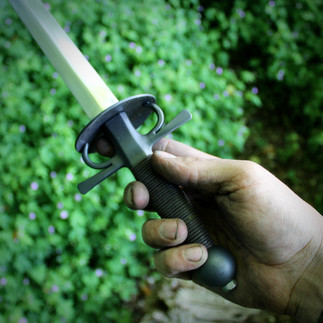The Quercus Smallsword
- Alicia Adams
- Jun 6, 2022
- 3 min read
Updated: Feb 15, 2024

The Quercus smallswords were created in conjunction with Dave Rawlings of the London Longsword Academy, and were designed as entry-level smallsword trainers that maintain the feel of historical duelling weapons.
The distinctive folded colichemarde blades will be game-changers for fencers accustomed to using sport fencing épée blades, getting closer to both the aesthetic air and the tangible balance of a true smallsword. The blades feature a softer flex, making the swords appropriate for nimble and dextrous training without heavy padding.
The guard has a deceptively delicate look, having been heat-treated throughout for sturdiness. The disc shells are welded directly to the false ricasso, lessening the chance of a rattle and making it easier to refit blades later in the sword's life.
The swords are named for the oak tree, referring to the Duelling Oaks of New Orleans, where colichemarde blades were frequently attested as the weapons of choice for settling affairs of honour. In the mid 1800s, as many as 10 duels a day were fought under the boughs of these trees.
Please see our pricing structure for an idea of what a similar sword would cost.
∴ Specs ∴

Total length: 96.5cm
Blade length: 82cm
Blade width: 3cm at base
Blade stock: 6mm
Grip length: 8cm
Grip and pommel: 11.5cm
Quillon span: 10cm
Guard to grip: 3cm
Point of Balance: 8cm from shell
Weight: 550g
Ambidextrous
Blunt edges
Rounded tip
Fencing flex
∴ Notes ∴

The hand-forged and heat-treated guard and spherical pommel are blackened to a matte finish. The guard features a faceted false ricasso, short, flat, flaring quillons, and small side rings curling around to meet a sturdy disc guard.
The oak handle is wrapped in a durable waxed linen cord for enhanced grip. The construction is finished with a faceted steel nut.
∴ Gallery ∴
∴ A Branch Extended ∴

The oak dominates the dusk-lit landscape, outspread arms dripping with bearded moss, a primordial giant stepping from the still-darkened bayou.
You shudder to think of such things - of the mangrove stench of the swampland, gators lurking anciently beneath the pea-soup waters. Of the stories the grandmothers tell in the town. If the oak tree were one of their saints or spirits, what manner of thing would it be? Would its arms be stretched out in a loving embrace, or would it be vengeful, terrible, intoxicated by the blood shed on its roots?
You shake yourself from such superstition. It is only the twilight talking: the low mists and the long shadows of near-dawn. If a shadow shifts against the tree's broad trunk, it is only your challenger. A nice, simple threat in the face of the sleeping city's strangeness. Just a man's wounded honour, and a strong sword arm.
The figure takes form as you near him, and you take a moment to size him up. Slight, but self-contained, like a chambered bullet. At his side hangs a simple duelling sword, but a proper one: you nod in begrudging appreciation to see the folded forte of a colichemarde blade beneath the black shell guard. Your opponent will parry well, and thrust unforgivingly.
"What's it to be then?" you bark as you reach measure. "Death or first blood?"
A pained look crosses the man's youthful face.
"You mistake me, sir," he responds. "I came only to seek your pardon. I spoke rashly last night, believing you to have been the source of a certain rumour. I have since discovered that I spoke in vain. I say we should make our peace at once."
You smile at the deflated young swordsman, and he stares back in dumb bemusement. Behind him the moss-robed oak god stands tall, primal patron of youthful pride.
"Where would the fun be in that?" you ask.


















